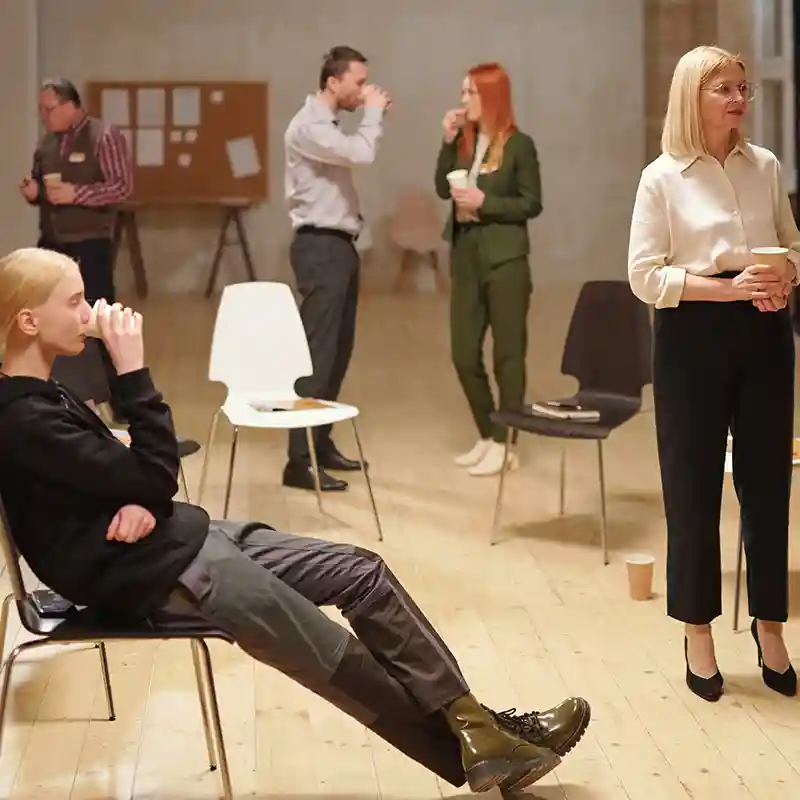Improvisation and Theatre
Entertainment | Improvisation and theatre
Here at the Centre for Psychology and Well-being in Zurich, we also have fun with theatre, which is not only an instrument of artistic expression, but a powerful form of personal exploration and growth. Used in a therapeutic context, theatre becomes a means to work on emotions, relationships and personal difficulties, turning them into opportunities for growth. Thanks to its creative and interactive nature, theatre encourages the exploration of interiority and the enhancement of psychological well-being.
Who is the theatre aimed at?
Theatre is a unique therapeutic modality because it unites body, mind and emotions in a holistic experience. It is particularly suitable for:
- Overcoming emotional blocks.
- Dealing with relational difficulties.
- Working on anxiety, depression and stress.
- Exploring the meaning of one's life and values.
Have you ever wondered who you really are? Have you ever felt the desire to explore the depths of your emotions and express yourself authentically? If the answer is yes, then this theatre course is what you are looking for!
Theatre is not just a performing art, but a powerful tool for personal growth. Through performing characters, interacting with others and exploring one's emotions, theatre offers a unique way to better understand oneself and the world around us. I will explain how:

And how can it help me?
- Development of emotional awareness: Theatre offers the opportunity to explore a wide range of emotions, from joy to sorrow, from anger to vulnerability. By playing different roles and situations, emotions that might be repressed or not understood can be recognised and accepted. This process helps improve emotional regulation and the ability to cope with difficult situations.
- Reduction of anxiety and stress: Participating in a theatre workshop allows you to 'disconnect' from everyday thoughts, immersing yourself in a creative and protected context. Through breathing exercises, use of the voice and movement, theatre reduces physical and mental tension, promoting a feeling of relaxation and lightness.
- Strengthening personal identity: Theatre allows people to wear 'masks' to better understand themselves. Through role play, one explores hidden sides of one's personality, strengthening self-confidence and consolidating identity. This process is particularly useful for those experiencing moments of change or personal crisis.
- Overcoming fear of judgement: Exposing oneself in front of a group of people may seem challenging, but it is precisely this gradual exposure that helps to overcome the fear of judgement. Theatre creates an environment free of criticism, in which every expression is accepted and valued, thus improving personal confidence and resilience.
- Processing of traumatic experiences: In the therapeutic field, theatre allows difficult experiences to be dealt with in an indirect but profound way. The staging of painful emotions or events, filtered through characters, helps to rework the experience, finding new meanings and greater serenity. Techniques such as improvisation or playback theatre are particularly effective in dealing with trauma or bereavement.

Used as an emotional tool
If you still have doubts about its effectiveness, here's what it can do:
- Improving communication skills Theatre stimulates active listening, verbal and non-verbal language, and the ability to adapt to different situations. This makes it particularly useful for those who want to improve their personal or professional relationships, developing empathy and assertiveness.
- Promoting empathy Playing different roles allows one to put oneself in the shoes of others, understanding their emotions and motivations. This strengthens empathy, improving the quality of social interactions.
- Teamwork and mutual trust Theatre is a collective experience that requires collaboration and support. Participants learn to trust others and work together to achieve a common goal, strengthening their sense of belonging and ability to cooperate.

Therapeutic applications of theatre
- Dramatherapy: is a specific form of psychotherapy that uses drama to help people express emotions and solve problems. It includes movement exercises, improvisation and storytelling to explore one's inner world.
- Theatre of the Oppressed: This approach, developed by Augusto Boal, focuses on personal and social empowerment. Used in therapeutic contexts, it helps to explore and resolve internal and external conflicts, offering new perspectives for change.
- Playback theatre: In this form of interactive theatre, participants relate personal experiences that are then enacted by the group. This process encourages sharing, emotional validation and mutual understanding.

There is still time to have fun and get to know each other better!
If you would like to book an appointment or ask us any questions to clear up any doubts, click below.
 Usiamo cookie tecnici per migliorare l’esperienza di navigazione.
Usiamo cookie tecnici per migliorare l’esperienza di navigazione.